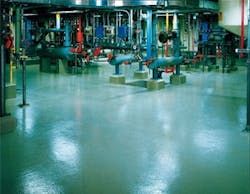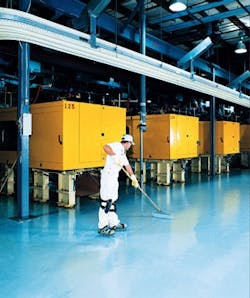Floor coatings look identical in the bucket. However, it's not until they are applied and exposed to the abusive conditions of a plant that the quality of their chemistry becomes apparent.
Recent technological advancements in floor coating chemistry have resulted in premium, high performance products with increased durability and service life. Once applied, the benefits of these advances become obvious.
Premium flooring is in the chemistry
Floor coatings are manufactured according to “recipes” or formulas that specify the type and amount of each raw material used. Although the recipe determines what’s produced, the grade of ingredients determines the quality of the finished product.
Floor coatings are now available with technologically advanced raw materials. When they are coupled with innovative formulations, coatings exhibit superior performance properties.
For example, in epoxy coatings, advances have resulted in a complex polyfunctional amine structure that exhibits improved bonding of the resins and hardeners within the molecular structure. This extends the service life of the flooring and reduces maintenance efforts.
Recent technological advancements in floor coating chemistry have resulted in premium, high-performance products with increased durability and service life.
While past technology was sufficient for most situations, most industrial floor coating systems are inadequate by today's standards for one primary reason: they were formulated years ago and developed without the latest raw materials available at the time. As a result, these coatings have exhibited poor color retention and excessive yellowing, as well as inferior chemical and impact resistance.
Advanced flooring equals enhanced benefits
The advantages of advanced chemisty are numerous. The complex interaction of resins and hardeners within the coatings results in superior application and performance characteristics—from easier, more convenient application methods to better color retention and improved chemical resistance.
The chemical composition within advanced flooring enables it to react favorably to combat indoor application challenges such as humidity, temperature, less-than-ideal preparation and other adversarial surface conditions. In addition, it demonstrates superior resistance to plant conditions, including spills of chemicals, grease and oil, acids and solvents, as well as physical abuse from everyday floor traffic.
An advanced chemical formulation also means your plant resumes operation within a day or two following application — a vital aspect for maintaining productivity and profitability. Additionally, newly formulated coatings offer lower and less obtrusive odor, allowing for application in occupied spaces or confined areas.
What to look for
Here are a few things to consider to ensure you apply the most advanced, highest-performing flooring:
A proven track record is important, but one dating back many years can indicate that a product's formulation might be outdated. Ask your coating supplier when the product was formulated and inquire about the chemistry behind it. Look for a reasonable balance between advanced coating technology and proven real-world performance.
Laboratory testing performance is available from your coating supplier and is a valuable part of the evaluation process. Floor coatings with sophisticated formulas and quality Ingredients will generally have higher levels of performance indicated by laboratory testing. Although these tests are conducted in a laboratory environment and should not be used as the sole indicator of performance in a plant, they are a valuable tool in the overall evaluation of a coating's quality.
You should also remember the importance of volatile organic compounds (VOCs) compliance. Regulations vary across the United States, but they typically allow 450 g./l. or less of VOCs. Check the product's information sheet to ensure that it complies with local requirements.
A key consideration is to look at the entire coating system, not just the individual product.
Coatings are designed to work together as a system and are tested to meet specific performance criteria in accordance with the recommended environmental exposures. Systems designed for offices or hallways may fail if exposed even to moderate chemicals or physical abuse. When deciding what floor coatings to select, look for similar projects where the entire system was applied and has performed successfully.
Lastly, be aware that there are numerous floor coating suppliers to choose from and many are small companies that lack the personnel and finances to keep their product formulas updated. Inquire about the supplier's history. Is it a start-up or a proven manufacturer in the floor coating industry? Does the company participate on a regional or national level? Is there a knowledgeable representative in your area? Does the company have a dedicated research and development department or does it purchase the formulations from an outside source?
The answers to these questions will help you select the right product for your application.
Mark Thomas is the Manager of Product Marketing for Tnemec Co., Inc. He can be reached at 800-863-6321 or mailto:[email protected].
Photos: Tnemec Co.


